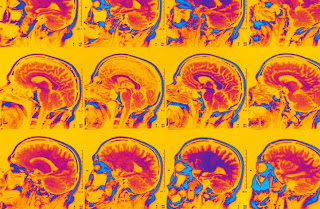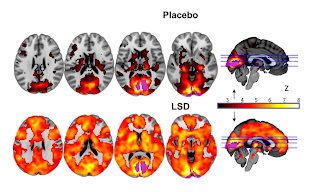Anyway, this has to be good news, right? In a press release from study lead Charles DeCarli of the University of California at Davis, he claimed “larger brain structures like those observed in our study may reflect improved brain development and improved brain health. A larger brain structure represents a larger brain reserve and may buffer the late-life effects of age-related brain diseases like Alzheimer’s and related dementias.” The scientists collected their data from MRIs conducted on more than 3,200 people between 1999 and 2019. Although current cases of Alzheimer’s are rising in number alongside America’s aging population, those cases are decreasing in terms of the incidence rate.
Some observers, of course, doubt the general population is gaining in average intelligence. Dr. Ismael Ponder of Gupton-Jones College in Decatur, Georgia says “If we’re getting so much smarter, how do you explain rap music, putting salt in hot chocolate and the Coeur d’Alene militia? If we were smarter, we’d have bigger heads, like those ETs you see in the movies, or Jay Leno. We’d have flying cars, less Republicans and more bluegrass music in our elevators. It’s ridiculous.”
Okay, so maybe bigger is not necessarily better, but it beats the alternative. Smaller brains? Now that’s terrifying.
Anandamide
“Hiya folks! Ya say ya lost your job today? Ya say it’s 4 a.m. and your kids ain’t home from school yet? Ya say your wife went out to get a corned beef sandwich last weekend. The corned beef sandwich came back but she didn’t? Well, lift your head up high and take a walk in the sun with dignity and stick-to-it-ness and show the world you’ll never give up, never give up that ship!”---Eddie Lawrence, the Old Philosopher
Richard Waggoner wants to make you happy, resurrect your bliss, send you directly to Cloud 9 without passing Go and collecting $200. He claims it’s our essential nature to be happy and things like Marjorie Trailer Queen, the near extinction of the Javan rhino and widespread condom snorting shouldn’t take the shine off our day. There is an ancient Sanskrit word for bliss, defined as the simultaneous experience of complete happiness, calmness, focus, clarity and presence and that word is ananda. But where, oh where, do you get the stuff? Richard Waggoner says he’ll sell you some.
Richard is the founder of a company called Immunocorp, a leading producer of immunity supplements for more than two decades. He never thought of developing a happiness pill until he read an amazing article in 2015 about a molecule your body makes called anandamide. Science has confirmed that anandamide can induce states of euphoria. You can zip up your own amount with intense exercise and even chocolate, but the human body soon metabolizes the stuff and excretes it out. And, of course, it’s another one of the million things your body produces less of as you age. According to Waggoner, low levels of anandamide can devastate your sense of wellbeing. We wondered what was doing that.
The first indications of lower levels of anandamide are usually experienced as moodiness or edginess, angry reactions to comments or situations which in the past might not have bothered you as much. Negative thoughts. Tiring easily. You’re out of balance. Life becomes a chore. Like Mighty Mouse, Richard Waggoner is on his way to save the day with a product called anandatol, a harmless natural formulation that seriously raises anandamine levels. Okay, so what’s in it?
The first ingredient, unsurprisingly, is high-quality hemp extract “in the right form and dosage, which works synergistically with 5 other plant extracts to help anandamide function optimally.” Those other extracts are Organic Black Pepper, Organic Clove, Organic Rosemary, Organic Hops and, believe it or not, Organic Jujube. Now that the Premier Theater is closed where else can you get Jujube? We’re going to get some for those grouchy moments when someone mentions Kanye West or Lil Yatchy. If you see us floating merrily over North Central Florida, you’ll know it works.
1. The human brain weighs three pounds, about the same as a half-gallon of milk. Men tend to have larger brains than women, but size does not always imply intelligence, as in the cases of Matt (Bigbean) Gaetz and Angelina Jolie.
2. Sixty percent of the brain is made of fat, thus the perfectly logical taunt “Fathead!” It’s the fattest organ in the human body and those fatty acids are crucial to your brain’s performance.
3. Your brain isn’t fully formed until age 25, the main reason you opt for teenage bungee-jumping, idolize muttonheads like Justin Bieber and hitchhike from Gainesville to Moline with only 2 dollars in your pocket.
4. It’s a myth you only use 10% of your brain unless you’re Donald Trump or Mike Pence. Most of us use our entire brain even when we’re sleeping. Our brains create dreams to help us deal with emotions, solve problems or manage hidden desires. And to frustrate Bill, who’s always losing his car.
5. During the mummification process, Egyptians would usually remove the brain through the nose. Jimmy Durante was easy.
6. Caffeine boosts brain function by blocking adenosine, an inhibitory neurotransmitter in the brain which makes you sleepy. Some studies suggest that caffeine may have a significant effect on short-term and long-term memory.
7. You cannot tickle yourself because the brain anticipates your own touch, canceling out the pressure you supply. So cut it out.
8. Your brain hypothetically has enough memory to store the entire internet. Then it explodes.
9. An orgasm activates roughly 30 systems in your brain, including the limbic system, hypothalamus and prefrontal cortex. So let’s not make it all about sex, you Barbarians.
LSD, The Brain’s Amusement Park
Opinions on Lysergic Acid Diethylamide are all over the map. It’s a pleasant diversion. It’s a dangerous nightmare. It makes crazy people sane. It makes sane people crazy. There are as many opinions on LSD as there are pebbles on Pismo Beach, endless studies on the subject and better anecdotes from users than you get from UFO advocates. A very good 2016 study from Current Biology that nobody seems to have noticed peeked into the brains of 15 people during an acid trip and found a treasure trove of information, including brain-scan backup for one of Acid’s most popular promises---the tripper feels at one with the universe.
The 15 healthy humans, all experienced users of Lysergic Acid Diethylamide, went twice to a lab in London to engage in a special experiment. The first time, they were injected with a small amount of LSD (75 micrograms), the other time they received a saline placebo. After an hour to let the effects settle in, the subjects got into an fMRI brain scanner, which captured images of what went on in their brains. The researchers asked the people to rate their mood changes and got answers like, “I’m tripping like crazy,” or “Nothing is happening,” etc., descriptions of visual distortions and their intensity of ego dissolution: a loss of self-identity and sense of connection to the environment outside of oneself which is a regular feature of LSD. “You don’t recognize yourself as a separate being from the universe,” says study co-author Enzo Tagliazucchi, a neuroscientist at the Royal Netherlands Academy of Arts and Sciences in Amsterdam. “It feels in a way like transferring the consciousness from within your body to the outside world; the focus is in the objects that surround you rather than inside.” Tagliazucchi and the team wondered if they could find some changes in the brain related to this feeling of ego dissolution.
When they looked at the regions of the brain involved in introspection and sensory areas that perceive the outside world, they found that these networks were communicating more intensely than usual. “When we measured the brains of subjects who were really blown away by LSD---who had a really strong feeling of ego dissolution---they were also the ones who had the strongest increase in communication between the network of regions in charge of introspection and the network of regions in charge of perceiving the external world.”
In a later study published in the journal PNAS, many of the same researchers, including Tagliazucchi, the scientists found that LSD changes visual information in the brain. While people are on Acid, they start to see activity going on in the brain which is normally suppressed from perception. The ability to see this internal activity is likely responsible for hallucinations and visual distortions on LSD, Tagliazucchi says. “So it’s possible that psychedelics could provide a therapeutic approach for people with anxiety or depression. Instead of taking a pill every day to change brain chemistry, it’s possible psychedelics could provide a few hours to break out from constricted thought patterns. If you combine this with psychotherapy during that window, you have this chance to reflect on things that your depression normally wouldn’t allow you to focus on.”
Acid-assisted therapy is a long way from going mainstream. Research of the type performed in London is only legal in a handful of places and the science is still in its early stages. But it holds great promise, especially for subjects who can’t be reached by traditional means. Of course, Timothy Leary knew all that sixty years ago.
He'll plant your feet firmly on the ground;
He flies so high, he swoops so low,
He knows exactly which way he's gonna go."
---Timothy Leary/The Moody Blues
Dr. Tim, of course, performed all his own studies. With a little help from his friends.
That’s all, folks….
bill.killeen094@gmail.com





